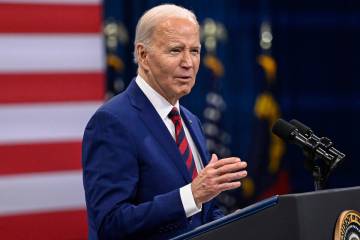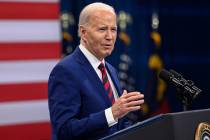Minimum wage bill will reveal Democrats’ strategy at Nevada Legislature
CARSON CITY — On Day 2 of the 2017 Nevada Legislature, Senate Democrats introduced a minimum-wage bill. Beyond heated debate, the bill will shed light on the strategy Democrats will use to push their liberal agenda.
SB106, sponsored by the Senate Committee on Commerce, Labor and Energy, would increase the minimum wage by 75 cents an hour each year for five years. That would give Nevada a minimum wage of $12 an hour for employers who don’t offer health insurance and $11 an hour for employers who do. The bills has no exemptions for teenagers, special-needs workers or training wages. The federal minimum wage is $7.25 an hour.
On the merits, it’s terrible policy. Minimum wage proposals are unjust, because the government should have no role in restricting the jobs available to low-skill or inexperienced workers. SB106 would increase the youth unemployment rate in Nevada, especially during the next economic downturn. Fortunately, Gov. Brian Sandoval understands this.
“Due to the predicted loss of jobs and harm to small businesses, the potential to block young people and individuals with less work experience from open positions, and an increase in consumer prices, the Governor has historically opposed a legislative mandate to increase the minimum wage,” said Mari St. Martin, Sandoval’s spokeswoman, while noting the governor doesn’t comment on specific legislation while it’s working its way through the Legislature.
The SEIU-backed Fight for $15 isn’t impressed, albeit for different reasons.
“The Fight for $15 doesn’t support anything that’s not $15 an hour,” said Jose Macias, a Las Vegas organizer with the Fight for $15. “We need $15. Not less than that.”
If Senate Majority Leader Aaron Ford, D-Las Vegas, overcomes liberal opposition — he will — and Sandoval vetoes this legislation, liberals have a plan B. Pass the minimum wage increase as a constitutional amendment, which requires a majority vote by each house for two consecutive sessions and voter approval in the 2020 general election.
“There will be a minimum wage bill that’ll pass both houses, and it’ll be up to the people to vote on that,” predicted Bob Fulkerson, state director of the liberal Progressive Leadership Alliance of Nevada. “I think it would be a great strategy for anything that’s going to run into the veto pen.”
Asked if Democrats would consider a constitutional amendment if the governor vetoes SB106, Ford demurred: “First things first, let’s talk about the bill.”
But Ford has to choose one of two paths. He could send the bill to Sandoval quickly and use the threat of passing an even larger minimum wage increase as a constitutional amendment to try to pressure Sandoval into signing a bill he doesn’t like. Or Ford could save the minimum wage for use as a bargaining chip in end-game negotiations. Assembly Democrats get a say as well.
Trying to show up the governor may cause Sandoval to more closely scrutinize — and veto — any bills Democrats send to his desk.
No matter what happens, Ford’s decision will tell a lot about how the session will play out.
Victor Joecks’ column appears in the Nevada section each Monday, Wednesday and Friday. Contact him at vjoecks@reviewjournal.com. Follow @victorjoecks on Twitter.























